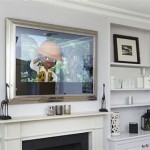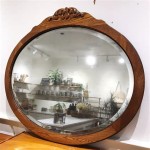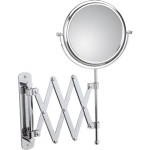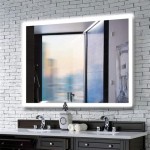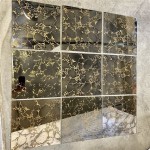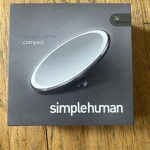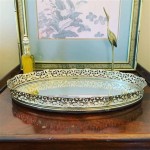How Many Mirrors Can You Put In A Room?
The question of how many mirrors one can place in a room doesn't have a definitive numerical answer. It's not a matter of a physical limit, but rather a consideration of various factors, including the room's purpose, desired aesthetic, and the effects of multiple reflections on the occupants' perception of the space.
Factors Influencing Mirror Placement
Several factors influence the practical and aesthetic implications of mirror placement within a room. These include:
- Room Size and Shape: Larger rooms can generally accommodate more mirrors without creating a disorienting effect. The shape of the room also plays a role, as irregularly shaped rooms may benefit from strategic mirror placement to enhance the perception of space.
- Room Purpose: A dressing room or bathroom may require multiple mirrors for practical purposes, whereas a living room or bedroom might use mirrors primarily for decorative purposes. The intended use of the space will dictate the number and placement of mirrors.
- Desired Aesthetic: Some individuals prefer a minimalist aesthetic with few reflective surfaces, while others embrace a more opulent look with numerous mirrors. Personal preference significantly impacts the decision-making process regarding mirror placement.
- Lighting Conditions: The existing lighting in the room interacts with mirrors, influencing the overall brightness and ambiance. Careful consideration must be given to how natural and artificial light sources interact with the reflective surfaces.
Practical Considerations for Mirror Placement
Beyond aesthetics, several practical considerations should be factored into the decision-making process when placing mirrors.
- Reflection Management: Multiple mirrors can create infinite reflections, which can be visually confusing or even dizzying. Strategic placement minimizes unwanted or distracting reflections.
- Safety and Security: Large or heavy mirrors require secure mounting to prevent accidents. Particular care should be taken in areas with high traffic or activity.
- Maintenance and Cleaning: More mirrors mean more surfaces to clean and maintain. The practicality of cleaning multiple mirrors regularly should be considered.
The Psychology of Mirrors in Interior Design
Mirrors can have a significant impact on the psychological perception of a room.
- Illusion of Space: Strategically placed mirrors can make a small room appear larger by reflecting light and creating an illusion of depth.
- Brightness and Light Amplification: Mirrors enhance natural light, making a room feel brighter and more welcoming.
- Focal Point Creation: A large or ornately framed mirror can serve as a focal point within a room, drawing the eye and adding visual interest.
Mirrors and Feng Shui
The practice of Feng Shui offers specific guidance on mirror placement for optimizing energy flow within a space. Considerations in Feng Shui include:
- Reflecting Positive Imagery: Mirrors should reflect positive images, such as plants or artwork, rather than clutter or negative elements.
- Avoiding Reflections of Doors or Beds: Feng Shui principles often advise against placing mirrors directly opposite doors or beds.
- Enhancing Natural Light: Mirrors are used to amplify natural light and improve the overall energy of a room.
Different Types of Mirrors and Their Placement
The type of mirror also plays a role in its placement within a room.
- Full-Length Mirrors: These are typically placed in bedrooms or dressing areas for practical purposes, allowing individuals to view their entire reflection.
- Decorative Mirrors: Smaller, ornate mirrors can be used throughout a room to add visual interest and reflect light.
- Wall Mirrors: Large wall mirrors can create a dramatic statement and visually expand a space.
Creative Uses of Mirrors
Mirrors can be used creatively to enhance a room's design and functionality.
- Mirrored Furniture: Mirrored furniture, such as tables or chests, can add a touch of glamour and reflect light.
- Mirrored Walls: An entire wall covered in mirrors can dramatically alter the perception of a room, making it appear much larger.
- Mirrored Backsplashes: In kitchens or bathrooms, mirrored backsplashes can add a touch of elegance and reflect light.
Maintenance and Care of Mirrors
Proper maintenance ensures the longevity and aesthetic appeal of mirrors.
- Regular Cleaning: Mirrors should be cleaned regularly with a suitable glass cleaner to remove dust, fingerprints, and smudges.
- Avoiding Harsh Chemicals: Abrasive cleaners should be avoided as they can damage the mirror's surface.
- Protecting from Moisture: In humid environments, proper ventilation helps prevent moisture damage to the mirror's backing.

Should You Put A Mirror In Every Room Of Your Home Giant Glass

How Many Mirrors Are Too In One Room

Good Life Of Design How Many Is Too

How Many Mirrors Are Too In One Room

Good Life Of Design How Many Is Too

You Can Never Have Too Many Mirrors Happy Nester

How Many Mirrors Are Too
:strip_icc()/LightDwell-3095c5279d0b4511b10d154f3a21a9b7.jpg?strip=all)
10 Feng Shui Rules For Mirrors According To Experts

How To Decorate With Mirrors Decorating Ideas For
:strip_icc()/Design_CathieHongInteriorsPhoto_ChristyQPhotography-1f0a7254eb7a435aa80046b0bf60d33b.jpg?strip=all)
10 Feng Shui Rules For Mirrors According To Experts

